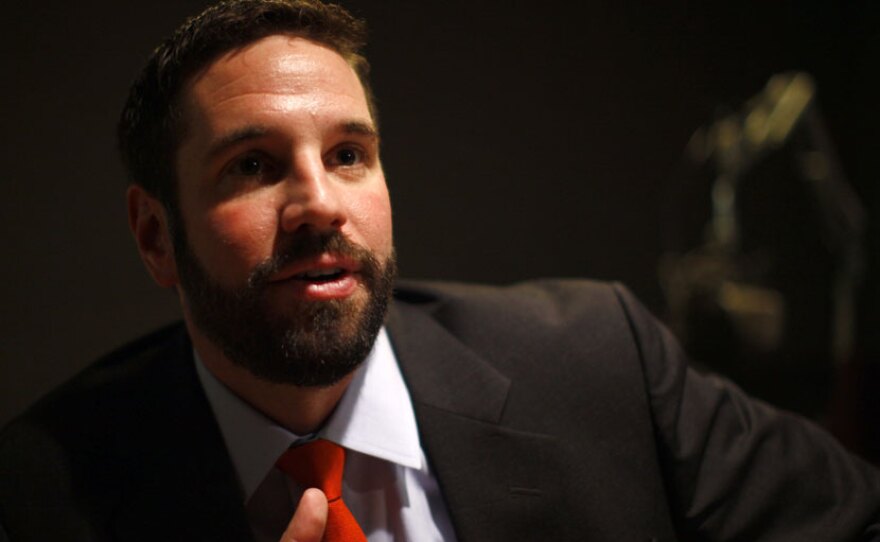A former Marine captain who became the first foreign service official to publicly resign in protest over the war in Afghanistan says staying in the country is not in America's interest.
"The losses of our soldiers do not merit anything that comes in line with our strategic interests or values," Matthew Hoh, who signed on as a foreign service official in Afghanistan after fighting in Iraq, tells NPR's Melissa Block.
Hoh resigned last month after spending five working months in Afghanistan. In his resignation letter, he said he had "lost understanding of and confidence in the strategic purpose of the United States' presence in Afghanistan."
Hoh says he is more concerned about why the U.S. is in Afghanistan than debating Gen. Stanley McChrystal's views or those of others in Washington. McChrystal, the top U.S. commander in Afghanistan, has asked for an additional 40,000 troops, a request President Obama is considering.
"I prefer to keep talking about: Is it worth winning?" Hoh says. "Is it worth losing more lives? And is it worth spending billions of dollars that, frankly, this country does not have?"
Hoh began his public service in the Marine Corps. Then, as a civilian Defense Department employee, he led reconstruction efforts in former Iraqi leader Saddam Hussein's hometown of Tikrit. Later, as a captain in the Marines, he fought in Iraq's Anbar province, where he was cited for "uncommon bravery." After his stints in Iraq, Hoh signed on as a foreign service official in Afghanistan, working on development efforts in Zabul province, a Taliban hotbed.
In his long resignation letter to the State Department, Hoh says the U.S. has not understood the true nature of the Afghan insurgency, and he uses the word "valleyism" to describe much of the insurgency there.
"In Afghanistan, everything is much more localized," Hoh tells NPR. "Allegiance is to your family, and then to your village or your valley, and that's what they fight for.
"There has not been a traditional central government there and I don't believe a central government is wanted, and actually, I believe, they fight the central government just as much as they fight the foreign occupiers," he adds.
Hoh says the five months he spent in Afghanistan, during which time he worked in two different parts of the country, put him in daily contact with Afghans. He says it was in conversations with them that his thinking on U.S. strategy in Afghanistan evolved.
"They are the ones that really codified my thoughts on this," he says. "And you realize that what they want is to be left alone."
In his letter, Hoh says families must be reassured their dead have sacrificed for a "purpose worthy of futures lost, love vanished, and promised dreams unkept. I have lost confidence such assurances can anymore be made." He says it was difficult for him to write that.
"But I don't believe we should continue losing and sacrificing our young men and women for goals that meet no strategic purpose to the United States," he tells NPR. "And the idea that we should continue fighting there just because we have been fighting there for the last eight years I think is completely irrational."
Hoh dismisses concerns, raised by others such as Secretary of State Hillary Clinton, that a U.S. withdrawal from Afghanistan will prompt a Taliban comeback and, consequently, a return of al-Qaida. He says after al-Qaida lost its Afghan safe haven following the Sept. 11, 2001, attacks, the group evolved its strategy, looking beyond a political or geographical boundary.
"They are not looking for a safe haven in Afghanistan. They don't need that," he says. "They've already got safe havens in half a dozen other countries — Somalia, Sudan, Yemen."
More to the point, he says, the vast majority of attackers in al-Qaida's successful operations, including Sept. 11, are not from the ethnic Pashto belt of Afghanistan or Pakistan. They are, in fact, from the West and the Persian Gulf states. The continued U.S. presence in Afghanistan only reinforces al-Qaida's message, and causes people to want to fight the West and to join its ranks, he says.
"We have an approach where we haven't evolved ourselves. We're still set up to do our foreign policy and our defense operations like we were in 1991, and we need to change," Hoh says. "Al-Qaida changed, they evolved. They got smart about how they're going to do their operations. We need to do the same."
Copyright 2022 NPR. To see more, visit https://www.npr.org. 9(MDAzMjM2NDYzMDEyMzc1Njk5NjAxNzY3OQ001))






